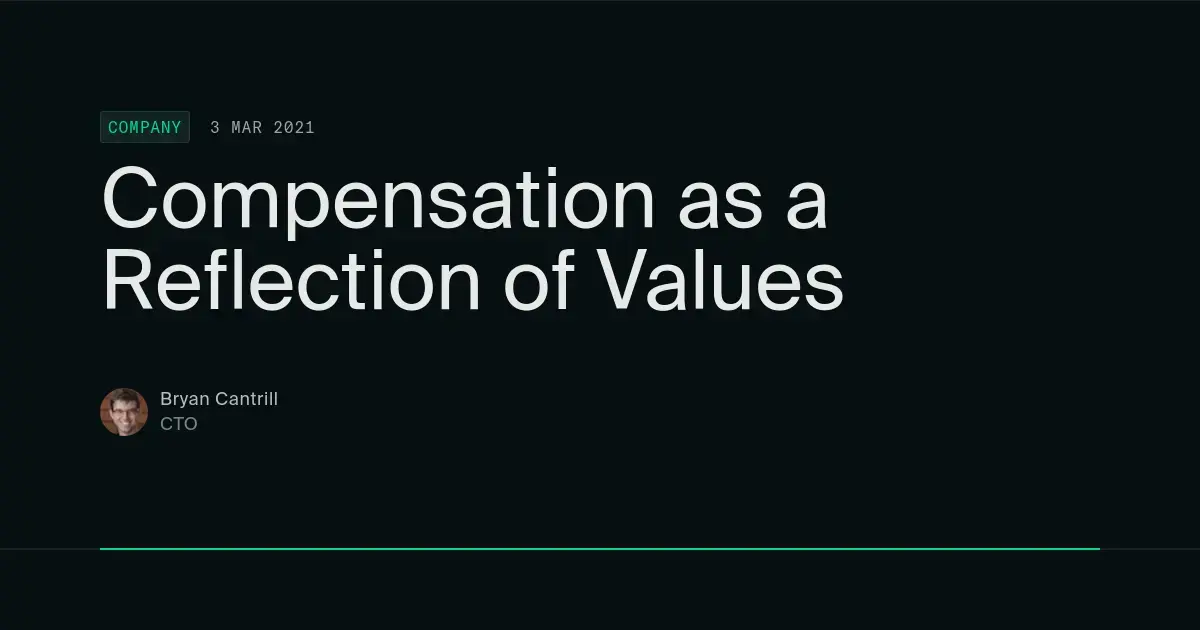Found via https://yorickpeterse.com/articles/what-it-was-like-working-for-gitlab/
I always considered the gitlab model, where the comp can be calculated via a public online tool, to be pretty progressive.
While this certainly doesn’t scale (as they admit) I think the sentiment is right.
The article is critical of GitLabs model, not celebrating it.
What GitLab does is far more open than what you’ll see elsewhere, but the formula is actually pretty near to what most companies do already: Have pay bands for positions, and then a modifier based on the region, level factors, and some other inputs. Normally this produces a range, not a straight number, and then negotiations take place within that band (which is also why this information and formula is not typically shared).
As for the idea of paying a flat salary for a position regardless of where the person works, that is simply a non-starter for most companies, and essentially creates a race to the bottom to locate the region of the world that will produce qualified workers for the lowest possible salary possible. We as a society have no problem seeing fast fashion or other manufacturing that do this as being exploitive and evil, and this model is exactly the kind of thinking that drives that behavior. If we stop caring about where a person lives and instead look only at salary vs production, we will only ever hire in the absolute lowest cost of living places in the world capable of producing acceptable workers.
We need to look at this from another angle as well - Companies are buying labor, much in the same way that they buy raw materials, property, or utilities. When buying any of these inputs to your business, how do you decide how much to pay? Certainly you do not sit down in a board room and agree on a number and then go out into the world with that number and attempt to purchase what you need. You start by looking at what the going market rate for those inputs are. People, like materials, have some wiggle room in those numbers, and sometimes paying a little more will get you better quality or more reliability, so you will need to make decisions there to determine where on the spectrum you wish to fall, but never would you pay significantly more than market rate, nor would you be able to pay significantly below.
I see this kind of discussion constantly in the last few years, and often in terms of tying inflation to annual salary increases. “If inflation was 10%, why is my annual raise only 5%?” - because overall inflation was 10%, but the inflation in the cost for a person that can do your job was only 5%. It’s truly and honestly that simple. You are a commodity item that goes to the highest bidder - act like it.
maybe my comment about gitlab didn’t come across right. i do find oxide’s model to be better and agree with their criticism of gitlab’s.
and as much as you are absolutely right about labour being treated much like any other commodity required for a company to extract value, that is precisely the issue being pointed at here, isn’t it?
we should differentiate and acknowledge that people are more complex than that. their experiment seems to create an atmosphere where work is being done despite compensation not being used as an incentive and instead to enable the worker to do the work.
i personally don’t think this should be a responsibility of a company at all, but rather society (or the state) should assure these conditions… but we are stuck with capitalism and this is a step towards something better :)
If it’s working for them, that’s great. I wonder how they deal with resentment if someone is not contributing as much as everyone else. Knowing compensation is equal for differing level of work could result in higher performers reducing their effort, leading to an overall decline in the work the team is doing.
I don’t wish for other people to be paid differently based on what I’m doing.
Do you think that if a team member who is producing less starts getting paid less, they’re going to work more? No, if anything they’ll produce even less.
Have you honestly felt resentment towards someone else because you chose to do more work than they did? You’re the one who controls how much work you do. How is it fair to them that your labor output level sets the bar for the salary? If they haven’t been let go, then it actually seems like they’re the ones closer to the actual proper output level for the salary, and you’re the one overproducing. Also, studies show that people overestimate their own contributions towards group work and underestimate others’.
That mindset is how you get a bunch of workaholics who are all terrified that someone else is producing more.
Chillax. Find your own groove that you feel is fair to your pay, and live in it.
Agreed with this. Even if one leaves the high performers out of the equation, if someone is consistently shirking work, and others are having to pick up the slack in order to make sure deadlines are met or that quality standards are reached, then that’s a recipe for resentment if pay is the same. I don’t think everybody on the team has to put in exactly the same level of work, and in a good working environment people tend to be pretty understanding of variances in output (both quality and quantity) as long as everybody is trying their best. Unless you’ve got someone that does significantly less than everyone else. To deal with that, you either need to have really good management, or pay rates need to reflect the actual work done.
The cleaner at thier office is laughing all the way to the bank.
deleted by creator
This was an interesting read, but I’ve got stuff to do today, so I skipped the 90 minute video on their “outrageously ambitious mission”. Anyone care to summarize?




